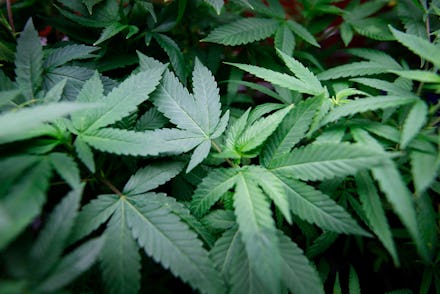The City of Berkeley Is Doing What No Other City Has for Medical Marijuana

Beat this, Obamacare: In a decision that's already stirring controversy, starting August 2015, medical marijuana dispensaries in Berkeley, Calif., will be required to donate at least 2% of their weed reserves to low-income residents.
What? The goal is to make available an increasingly in-demand form of medication, which nonetheless remains unaffordable for many patients in need.
"There are some truly compassionate cases that need to have medical marijuana," Berkeley Mayor Tom Bates told the New York Times. "But it's expensive. You hear stories about people dying from cancer who don't have the money."
Background: The New York Times reports the measure sailed through Berkeley's city council by unanimous vote this summer. But make no mistake: Free cannabis still has its enemies.
Most use the same alarmist rhetoric that raised erroneous fears around recreational legalization in Colorado and Washington this year.
"Instead of taking steps to help the most economically vulnerable residents get out of that state, the city has said, 'Let's just get everybody high,'" said John Lovell, a lobbyist for the California Narcotic Officers' Association.
More: Lowell added that greater marijuana availability "would sap patients' motivation to look for work" — because obviously the most important thing a sick person can do is quit whining and get a better job. Not to mention his concern that medical marijuana can "easily be resold on the street for profit," as if that risk were exclusive to low-income patients alone:
"I don't see anything progressive about that," he told the New York Times.
We're sure you don't, John. Fortunately, the measure is moving forward regardless.
Which is good, because countless studies, tests, doctors and medical experts have affirmed cannabis' effectiveness at treating a range of ailments, from HIV, Alzheimer's and cancer to opiate addiction, epilepsy and anxiety.
But: Challenges still arise when poorer patients are required to fork over "up to $400 an ounce." And without their medicine, many cope with often-devastating symptoms while going cold turkey.
Which is why Berkeley's system is so important. California has long been a pioneer in the field, with medical marijuana legal there since 1996, the longest such tenure in the United States. Local availability is pretty widespread, but patients still need a certification card to access services provided by dispensaries.
The New York Times also reports that "compassion systems," in which vendors provide cannabis to low-income patients at a discount, aren't unique to Berkeley: Many locations in San Francisco already have similar policies, though they're generally less formalized.
The main difference is that Berkeley dispensaries will be required to give low-income patients the same quality cannabis as those who pay for it. Progressive? You bet. And according to Mayor Bates, that isn't even the ultimate goal.
"I think what we're seeing now is an evolution towards full legalization," he said. "It's coming. It may not be in the next few years, but it's coming."
One can only hope.
h/t New York Times